"It is the people who build cities, while the madness of princes destroy them" - Erasmus
The Chang Vietnamese restaurant was in full swing. Impeccably English-speaking staff whisked bowls of steaming pho soup to its young, good-looking urban clientele.
Next door, the Chichiko Georgian restaurant was delighting customers with fried Khinkali and ruby Georgian wine.
Next to Chichiko, live Latin jazz wafted out of the Cuban-themed EscoBar.
It was Friday night on Yarslaviv Val Street in Kyiv, 18 February. On the surface, if young and hip Kyivans were worrying about the strangulation then destruction of their beloved capital, they were not showing it.
That morning, as I perused the Honey patisserie breakfast menu across the street, it occurred to me that Russian tanks could not possibly roll into a city that served avocado toast with halloumi cheese.
Five days later, Russian missiles struck the city's airport, and a full scale invasion was unleashed. Russian tanks are now at the gates of a desperate Kyiv.
In the space of a bewildering few weeks, Russian President Vladimir Putin's assault on Ukraine has violently upended Europe’s geopolitics. Ukrainian leaders already talk of World War III, and Mr Putin has cocked the nuclear gun.
While the gastronomic salons of Kyiv pointed to Ukraine’s aspiration to be another prosperous EU country, the Kremlin is dragging Europe - and the world - back into the unfinished business of the 20th century, and even back further into the Russian imperium of a distant era.
'Russky Mir'
"Putin has articulated an idea of there being a 'Russky Mir' or a 'Russian World,’" Fiona Hill, the former US official specialising in Russia, told Politico this week.
"This idea of a Russian World means re-gathering all the Russian-speakers in different places that belonged at some point to the Russian tsardom."
While the invasion of Crimea in 2014 was denied and then cloaked in Kremlin double-speak, these days the Russian president is viscerally upfront about what he thinks about Ukraine - ie, that it doesn’t deserve to exist.
"[Ukraine] is an inalienable part of our own history, culture and spiritual space," Mr Putin told state television days before the invasion.
"Since time immemorial, the people living in the south-west of what has historically been Russian land have called themselves Russians and Orthodox Christians."
The TV address blamed everyone for the crisis, except Mr Putin’s Russia.
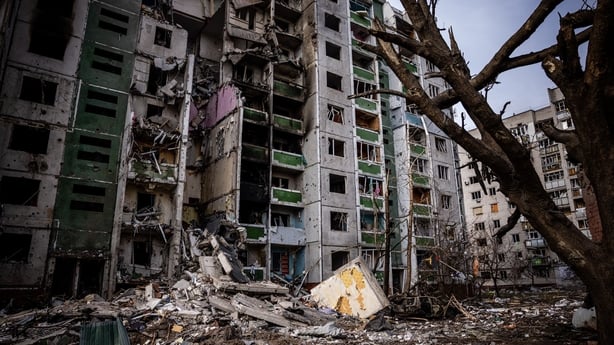
Ukraine had been "crazily" created by Bolsheviks in 1917, as Lenin, and later Stalin, gave too many rights to nationalities within the new Soviet Union and then handed over to these polities chunks of land and populations that were properly Russian.
When it gained independence in 1991, Ukraine "mindlessly" sought to emulate foreign models (ie democracy) which "have no relation to history or Ukrainian realities".
Ukraine was run by corrupt oligarchs who used the veneer of statehood to enrich themselves at the expense of ordinary Ukrainians.
The "neo-nazis" who later took over were aided and abetted by the United States through a coup d’etat during the Euromaidan protests in 2013-14.
A puppet of the west, Mr Putin concluded, Ukraine was committing genocide against Russian speakers in the east, and would soon be a nuclear-armed power directing its missiles against Russia.
And finally, NATO.
Russia had been cheated by the West, which had promised no NATO expansion after the collapse of the Soviet Union. Yet, railed Mr Putin, there had been five waves of expansion.
"They just do not need a big and independent country like Russia around," Mr Putin summarised.
Many commentators in the West still point the finger at NATO, even as women and children are being slaughtered by Russian bombs.
The story of NATO and Ukraine is a complex one, and in the turbulent days of the USSR’s collapse and Ukraine’s emergence as an independent state, many actors were guilty of rushed decisions and a neglect that stored up trouble for the future.
Wedged between the "new Europe" of former satellite states and Mr Putin’s Russia, Ukraine’s fate was never going to be easily resolved. Add to the mix the Kremlin’s heavy emphasis on Kyivan Rus’, the 9th-13th century dynasty, which has been the font of Russia’s origin myths.
The roots of the invasion can be traced, however, to a more recent era.
Soviet Union
The Soviet Union ceased to exist thanks to a late night meeting in a Belarus hunting lodge on 8 December 1991.
In the lodge were the presidents of three soviet republics: Boris Yeltsin of Russia, Stanislav Shushkevich of Belarus and Ukraine’s Leonid Kravchuk, whose parliament had overwhelmingly voted for independence from the USSR the previous week.
Russia needed its own currency to save its crippled economy, and Yeltsin wanted to consolidate his power base to pursue liberal democracy.
He therefore wanted to follow in Ukraine’s footsteps (Russia was one of the first states in the world to recognise its independence) by pulling out of the Soviet Union and creating a new union that would still closely bind Ukraine to Russia.
Yeltsin feared Russia would be outnumbered by non-Slavic republics in the new rump union. He also needed Ukraine’s wealth and industry to help prop Russia up.
Thus, the Soviet Union was consigned to history, literally overnight, but Ukraine was having no truck with a new Russian dominated union. In the event, a commonwealth of independent states was created.
Yeltsin was not the only one who feared "full" independence for Ukraine.
America was also cool on the idea. In June 1991, there had been a ten-day war when Slovenia broke free from Yugoslavia. Washington feared a violent and destabilising break up of the Eastern Bloc.
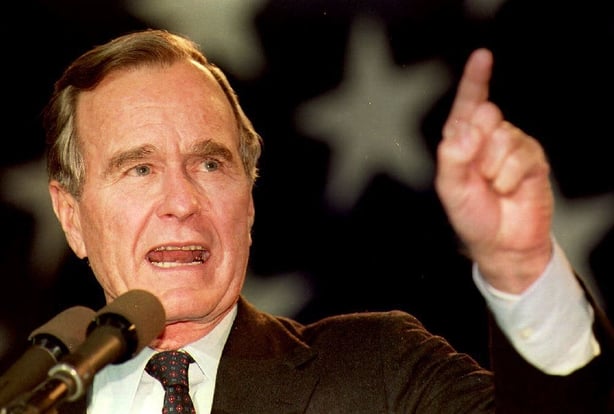
On 1 August 1991, President George Bush told Ukraine’s parliament: "Freedom is not the same as independence.
"Americans will not support those who seek independence in order to replace a far-off tyranny with a local despotism. They will not aid those who promote a suicidal nationalism based upon ethnic hatred."
The speech had gone down "about as well as cod-liver oil", one Kyiv-based diplomat told the Los Angeles Times.
Third largest nuclear power
Despite Bush’s (and Yeltsin’s) warnings, 90% of Ukrainians voted for independence that December.
In Crimea, with a large Russian-speaking population, 54% voted in favour, while in the Donbas region - where Russia would later establish two secessionist areas in 2014 - some 80% approved of independence.
But by gaining independence, Ukraine had also overnight become the world’s third largest nuclear power. It had inherited 1,900 nuclear warheads and 2,500 tactical nuclear weapons.
"Ukrainian strategic weapons could destroy American cities," wrote Serhii Plokhy, Professor of Ukrainian History at Harvard and Mary Elise Sarotte, Professor of Historical Studies at Johns Hopkins, in Foreign Affairs in January 2020.
"Determining who, exactly, would have both launch command and practical day-to-day control over the weapons became an immediate priority of the Bush administration."
James Baker, the Secretary of State, warned Bush of a "Yugoslav-type situation with 30,000 warheads".
Washington believed that only Russia should emerge from the debris of the USSR with its nuclear weapons intact. Bush and Yeltsin worked together to persuade Kyiv to de-nuclearise.
Thanks to the Chernobyl disaster, Ukraine was biddable. However, there had been clashes between Kyiv and Moscow over the fate of the Black Sea fleet, stationed in (now Ukrainian) Crimea.
If the newly independent country was going to give up its nukes, it wanted financial and political guarantees, including recognition by Russia of Ukraine’s borders.
At a summit in Budapest in 1994, which created the Organisation for Security and Cooperation in Europe (OSCE), Ukraine was offered assurances (not guarantees) of its territorial integrity if it agreed to hand over its nuclear weapons.
The country was on the verge of economic collapse and at risk of international isolation if it did not sign the Budapest Memorandum.
Under pressure, Ukraine signed. In return it received badly needed financial assistance, and an offer to join the so-called Partnership for Peace, a NATO-sponsored organisation designed to foster security between the alliance and former Soviet satellite states (Ireland joined in 1999).
That, at least, would offer a brow-beaten Ukraine further comfort. However, Kyiv had no illusions about Russia’s intentions in keeping its promises over Ukraine’s territorial integrity.
'Neo-isolation'
Despite the hoopla that accompanied the Budapest Memorandum (Yeltsin and Bush’s successor Bill Clinton appeared to have jointly sorted out the post-Cold War European order), Yeltsin was increasingly annoyed about NATO expansion.
Yeltsin had already written to Clinton the previous year to complain about the desire of newly liberated Poland, Hungary and the Czech Republic to join NATO.
The Russian public, he said, would see this as "the neo-isolation" of Russia, and would violate the treaty establishing German unity in 1990.
"The spirit of the treaty," Yeltsin wrote, "precludes the option of expanding the NATO zone into the East."
Indeed, much of the Russian bitterness, from Yeltsin to Putin, goes back to German unification in 1990.
While a lot has been written in recent weeks based on the recollections of diplomats and foreign ministers, what exactly was promised to Moscow about NATO expansion when Germany was unified remains a source of debate.
The then French foreign minister Roland Dumas later said NATO promised not to move an inch closer to the territory of the former Soviet Union.
The German foreign minister Hans-Dietrich Genscher, haunted by Soviet tanks rolling into Budapest in 1956, said in January 1990 that Nato should propose that "whatever happens to the Warsaw Pact, there will be no expansion of NATO territory to the east and closer to the borders of the Soviet Union."
Mikhail Gorbachev, the reforming Soviet leader, said that Germany and America had promised him that NATO would not expand to the east, but he later said the topic was not discussed.
James Baker has denied promises were made, yet the former British prime minister John Major, on a visit to Moscow in March 1991, said that "nothing of the sort would happen" when asked about possible NATO membership for Poland, Hungary and the Czech republic.
"There is, of course, no legally binding agreement between the two sides from the period following the fall of the Berlin Wall," writes Klaus Wiegrefe in Der Spiegel.
"The verdict as to whether the West has broken its word depends entirely on how binding one believes the assurances made by Major and the others actually were."
The initial assurances, written or not, were made at a time when the Soviet Union still existed.
With the hindsight of eastern Europe’s peaceful transition into the European Union, it can be forgotten that the Cold War was a high-tension standoff between nuclear powers, and statecraft was strictly guided by stability and no sudden moves.
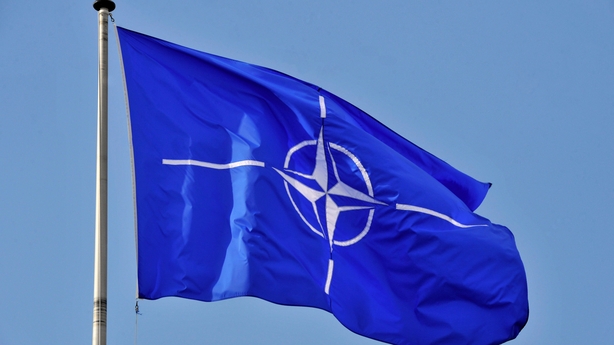
In other words, the West did not want hasty NATO membership for countries that were still effectively part of the Warsaw Pact.
"We have no intention," Bush had said in February 1990, "even in our thoughts, to harm the Soviet Union in any fashion."
Despite that, Baker felt he couldn’t ride roughshod over the sovereign wishes of fledgling democracies in central and eastern Europe.
Furthermore, Bush administration hawks like defense secretary Dick Cheney and undersecretary of state Paul Wolfowitz, the future Iraq War neocon, wanted the door to Nato membership to be left ajar.
Even after the USSR collapsed there was still the nuclear legacy. In December 1994, the US secretary of defence William Perry warned President Clinton that NATO expansion could derail strategic arms reduction talks.
But by 1997, the momentum of central and eastern European countries joining NATO became unstoppable. Yeltsin approved their membership, but complained he had been pressured into doing so. In 1999, Hungary, Poland and the Czech Republic joined NATO.
Russian nationalism
On New Year’s Eve 1999, Vladimir Putin, the former KGB officer stationed in East Germany, succeeded Yeltsin. This changed everything.
"In contrast to Yeltsin," wrote Plokhy and Sarotte in Foreign Affairs, "Putin made a concerted effort to reassert Russian influence in the post-Soviet space, first through political and economic means and then by using military force. Western policymakers, however, clung to the belief that Putin had been installed to continue the domestic and international course established by Yeltsin."
The West either misread or underestimated both Putin’s growing resentment, and his simultaneous squeezing of the institutions of liberal democracy.
Mr Putin embarked on a Russian nationalism based on a strong-state, a muscular Orthodox Christianity (entirely at odds with his Soviet-era atheism), a crackdown on independent media and opposition, and a desire to restore the Soviet sphere of influence.
This put him on a collision course with the West and with Ukraine. The former increasingly rejected the notion of spheres of influence, arguing that if sovereign countries wanted to join the EU or NATO it was their right to do so.
In 2004, eight eastern and central European countries joined the EU.
Among them Latvia, Estonia and Lithuania also joined NATO. This was a bitter blow to Putin: the Baltics had been part of the Soviet Union.
Whatever about poking the bear, the candidate countries had witnessed Russia’s brutal wars against Chechnya, Transnistria and Abkhazia. Joining NATO commanded strong popular support.
But Ukraine was left exposed. There was no prospect of either EU or NATO membership.
Partnership for Peace had become a poor relation to joining NATO meaning Ukraine was at the mercy of Russian revanchism.
Without a front door into NATO, Ukrainians instead took to the streets.
In 2004 after the pro-Russian candidate Viktor Yanukovych claimed victory in a rigged election, tens of thousands of demonstrators launched the Orange Revolution, a grassroots bid to end corruption and to steer Ukraine towards the West.
Similar colour revolutions broke out elsewhere in the former Soviet space, in Georgia and in Kyrgyzstan.
At the NATO summit in Bucharest in 2008, George W Bush and Poland’s Lech Walesa strongly pushed for an invitation to both Ukraine and Georgia to join NATO.
Mr Putin, who attended a sideline NATO-Russia summit on day two, was staunchly opposed.
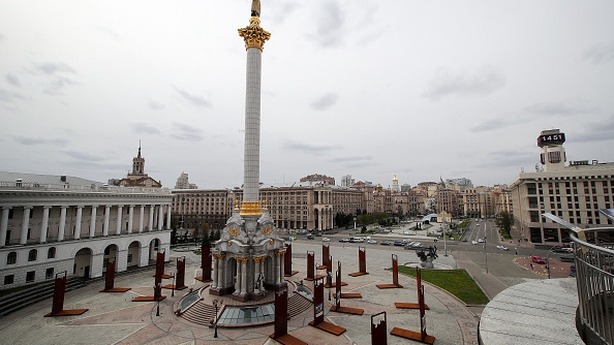
Colour revolutions
The UK, France and Germany argued that Ukraine’s and Georgia’s membership be kept in the balance. The final text was watered down to a promise that they could join some day (but with no timetable to do so).
Just four days later Russia attacked Georgia, ostensibly to protect the two pro-Russian enclaves of Abkhazia and South Ossetia.
While hostilities were limited, the Kremlin ended up recognising the two enclaves and steadily increased Russia’s military presence there.
Mr Putin had two reasons to oppose colour revolutions: he regarded those countries as part of Russia’s domain; they also posed a direct threat to his personal regime, should ordinary Russians decide to have a colour revolution of their own.
Ukraine continued to push for a European destiny. In 2013, when the country was about to enter a new EU-Ukraine association agreement, Mr Putin, now aligning himself more aggressively with Kyiv’s Orthodox Christian origins, pressured the then president Viktor Yanukovych to reject the deal in favour of a closer relationship with Moscow (along with $15 billion in aid).
The move prompted mass outrage and weeks of protests in Maidan, the main square in Kyiv.
A furious Mr Putin, who the year before had faced middle-class street protests in Moscow after he returned to the presidency in a questionable election, encouraged the brutal suppression of the protests.
On 18 February 2014, 107 people were shot dead. In the upheaval that followed, Yanukovych fled to Russia.
Mr Putin sent Russian troops to seize Crimea, and fomented a secessionist uprising in the pro-Russian eastern Ukrainian regions of Donetsk and Luhansk. The notion that Ukraine had somehow been taken over by fascists was embedded in the Kremlin’s narrative.
An eight-year conflict between Kyiv and the two self-styled "People’s Republics" cost 13,000 lives, but more importantly it allowed Mr Putin to perpetually incapacitate Kyiv’s ability to make sovereign choices about its alliances.
The Kremlin saw the Minsk Accords, designed to end the fighting, as giving the two regions a veto on foreign policy.
The West’s outrage over the invasion of Crimea dissipated over time and Russia weathered the sanctions that followed.
NATO's eastern expansion
According to experts, Mr Putin saw the polarisation in America and Europe as evidence that democracy was in decline: it was time to act.
"In his view," wrote Angela Stent, Non-resident Senior Fellow at the Brookings Institution, "the United States is weak, divided, and less able to pursue a coherent foreign policy. His decades in office have made him more cynical about the United States’ staying power."
The irony is that there was no question of Ukraine joining NATO any time soon.
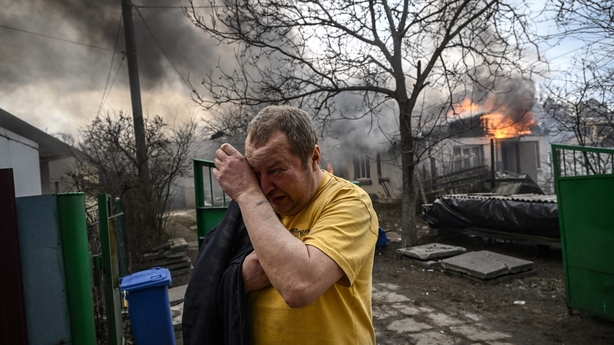
Under its charter, American troops would have been expected to protect a country containing two secessionist enclaves funded and armed by Moscow, and a region (Crimea) that Russian troops had already annexed.
NATO officials warned Kyiv that membership was not on the cards.
Yet, Mr Putin saw only threats. A British destroyer was fired upon by Russia in the Black Sea last June, and in November Mr Putin was outraged when a US strategic bomber flew to within 20 kilometres of Russia’s border, also in the Black Sea.
"As tensions rose," wrote Dmitri Trenin, director of the Carnegie Moscow Centre, "Western military advisers, instructors, arms, and ammunition poured into Ukraine. Russians also suspect that a training center the United Kingdom is constructing in Ukraine is in fact a foreign military base. Putin is particularly adamant that deploying US missiles in Ukraine that can reach Moscow in five to seven minutes cannot and will not be tolerated."
In December, having massed tens of thousands of troops on Ukraine’s borders, Moscow published two draft treaties it wanted America and NATO to sign: the demands included a formal halt to NATO’s eastern expansion, a permanent freeze on further expansion of NATO’s bases and weapons systems in central and eastern Europe, an end to Western military assistance to Ukraine, and a ban on intermediate-range missiles in Europe.
These were non-starters (the treaties made no demands on Russia). There followed an intense phase of Western diplomacy designed to forestall an invasion. Washington talked of confidence building measures, greater transparency around military exercises and talks on where missiles were deployed.
But Russia had to pull back its forces first.
Sergei Lavrov, Russia’s foreign ministry, wrote a stern letter to EU and OSCE member states (including Ireland) demanding that they clarify their understanding of both the Charter of European Security, agreed in Istanbul in 1999 and a follow up communique in Khazakstan in 2010.
Mr Lavrov claimed the "indivisibility of security" principle enshrined in the charter meant no country should increase its security at the expense of another (he failed to mention that the Charter also committed signatories to "respect for human rights and fundamental freedoms, democracy and the rule of law" and the notion that sovereign states could choose their own foreign policy).
The exhaustive diplomacy has come to nought.
Theories that Putin was bluffing to extract maximum concessions have proved sadly naive.
Furthermore, having failed to capture Kyiv quickly and force the government of Volodymr Zelenskiy into submission, Mr Putin appears hell bent on levelling cities to the ground and causing mass civilian casualties in order to get his way.
One painful lesson has been learned. Those new democracies in eastern Europe, who knew why it was important to join NATO, have been vindicated.
Ukraine, also a new democracy, albeit with its own problems of corruption and oligarchs, sought NATO membership for the very same reasons: to avoid a Russian invasion.
In the light of Russia’s savage assault on an independent and outgunned country, the question of whether Ukraine had the right to berth itself in NATO’s protective framework, has been given some brutal clarity.
As for Mr Putin’s angry-dreamy discourses about Russia and Ukraine’s ancient and spiritual brotherhood, ask the residents of Kharkiv, Ukraine’s most Russian city, where civilian casualties are soaring, how they now feel about Mr Putin’s idea of brotherhood.







